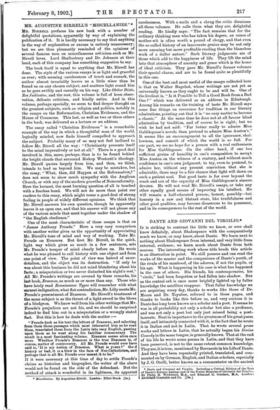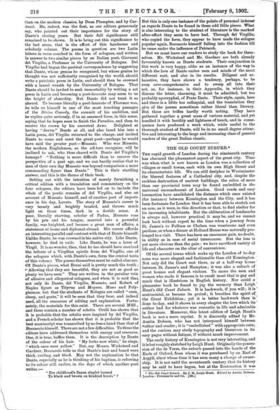DANTE AND GIOVANNI DEL VIRGILIO.* IT is striking to contrast
the little we know, or ever shall know definitely, about Shakespeare with the comparatively much we know, or may know, about Dante. We learn next to nothing about Shakespeare from internal, and very little from external, evidence ; we learn muoh about Dante from both sources. The interesting work whose title heads this article is an illustration in point. We still possess and can read the works of the master and the companions of Dante's youth, of the rivals of his manhood, of the adorers, if not the pupils, of his age. What is happening in his case is what has happened in the case of others. His friends, his contemporaries, his circle," had been forgotten or had fallen into shadow. But as the central orb is once more brightly lighted up by fuller knowledge the satellites reappear. That fuller knowledge we are acquiring every day, thanks to works like those of Dr. Moore and Dr. Toynbee, referred to in these pages, and. thanks to books like this before us, and very curious it is. Dante has long been known as a scholar and a poet. It seems he was in all probability not only a scholar but also a professor, and was not only a poet but only just missed being a poet-. laureate. Next in importance to the greatness of his great poem itself, and intimately connected with it, is the fact that he wrote it in Italian and not in Latin. That he wrote several prose works and letters in Latin, that he actually began his Divine Comedy in the same tongue, is generally known. That at the end of his life he wrote some poems in Latin, and that they have been preserved, is not to the same extent common knowledge. They are, it is true, mentioned by Boccaccio in his Life of Dante. And they have been repeatedly printed, translated, and com- mented on by German, English, and Italian scholars, especially by J. G. Orelli, better known as a commentator on the ancient
• Dante and Giovanni del Virgilio. Including a Critical Edition of the Test of Dante's Eclogue Latinae and of the Poetic Remains of Giovanni del Virgilio.
By latig Wtlektedd 60M.k.. chaold Edmund G. Gardner, LA. London:
than on .the modern classics, by Dean Plumptre, and by Car- ducci. He, indeed, was the first, as our editors generously say, who pointed out their importance for the story of Dante's closing years. But their full significance still remained to be shown. It is to bring out this significance to the last atom, that is the effort of this handsome and scholarly volume. The poems in question are two Latin letters in verse couched in the form of eclogues, and written inanswer to two similar pieces by an Italian poet, Giovanni del Virgin°, a Professor in the University of Bologna. Del Virgilio had begun the poetical correspondence by suggesting that Dante, whose genius he recognised, but whose genius he thought was not sufficiently recognised by the world, should write a patriotic poem in Latin, and should then be crowned with a laurel wreath by the University of Bologna. That Dante should be invited to seek immortality by writing a set poem in Latin and becoming a poet-laureate may seem to us the height of absurdity. But Dante did not treat it as absurd. To become literally a poet-laureate of Florence was, he tells us himself in one of the most touching passages of the Divine Comedy, the summit of his ambition, and he replies quite seriously, if in an assumed form, in this sense, saying that he hopes soon to finish the Paradise, and then to receive the crown by his ancestral Arno. Delighted at having " drawn " Dante at all, and also lured him into a Latin poem, del Virgilio returned to the charge, and invited Dante to come and meet the great poet—perhaps he would hate said the greater poet—Mussato. Who was Mussato, the modern Englishman, as the editors recognise, will be inclined to ask, who thus shared with Dante del Virgilio's homage? "Nothing is more difficult than to recover the perepective of a past age, and we can hardly realise that to ram of their own day Mussato was beyond comparison a more commanding figure than Dante." This is their startling andwer, and this is the theme of their book.
Setting out with the intention of merely furnishing a critical edition with a translation and commentary on the four eclogues, the editors have been led on to include the whole of the poetic remains of del Virgilio, and also an account of Mussato himself, and of another poet of import- ance in his day, Lovato. The story of Mussato's career is very tersely and brightly treated, and throws much light on those times, dark in a double sense. A poor, literally starving, scholar of Padua, Mussato rose by his pen and his tongue, married into a powerful family, was knighted, and became a great man of affairs, a statesman at home and diplomat abroad. His career affords an interesting parallel and contrast with that of Dante himself. Unlike Dante, he was crowned in his native city. Like Dante, however, he died in exile. Like Dante, he was a lover of Virgil. It is no wonder, then, that he too should have received the tribute of a Virgitian epistle from del Virgilio, one of the eclogues which, with Dante's own, form the central texts of this volume. The poems themselves must be called obscure. Of Dante's pieces, what Muni said is pretty much the truth : "Allowing that they are beautiful, they are not as good as plenty we have seen." They are written in the peculiar vein of allusive and allegorical eclogues, and when it is said that not only do Dante, del Virgilio, Mussato, and Robert of Naples figure as Tityrus and Mopsus, Muso and Poly- phemus; but that the students of Bologna are called "oxen, sheep, and goats," it will be seen that they bear, and indeed need, all the resources of editing and explanation. Fortu- nately, the materials for this exist. There are several MSS., and these contain a number of scholia. Orelli has shown that it is probable that the scholia were inspired by del Virgilio, and a French scholar has shown that it is probable that the best manuscript was transcribed by no less a hand than that of Boccaccio himself. There are not a few difficulties. To these the
editors have addressed themselves with energy and resource. One, it is true, baffles them. It is the description by Dante of the colour of his hair. " My locks now white," he sings, "which once were yellow." But, say Messrs. Wicksteed and Gardner, Boccaccio tells us that Dante's hair and beard were thick, curling, and b/Uck. May not the explanation be that Dante, especially as be is thinking of his baptism, is referring to its colour still earlier, in the days of which another poet writes " Ere childhood's flaxen ringlet turned To black and brown on kindred brows" ? But this is only one instance of the points of personal interest as regards Dante to be found in these odd little pieces. What is also interesting to the student of literature is the marked after-effect they seem to have had. Through del Virgin°, who copied the form, they appear to have made the eclogue popular again, Boccaccio himself falling into the fashion till he came under the influence of Petaurch.
But we must leave our readers to study the book for them- selves. Mr. Wicksteed and Mr. Gardner are both already favourably known as Dante students. Their conjunction in this work is very happy, alike as an instance of the way in which the love of Dante unites men and minds of the meat different sort, and also in its results. Diligent and ex- haustive, they have shown a tendency, perhaps, to be even over-comprehensive and to sweep all into their net, as, for instance, in their Appendix, in which they discuss the letter, charming, it must be admitted, but too probably apocryphal, of Frate Dario. Their style, again, here and there is a little too colloquial, and the translation they give of the poems sometimes rather literal than literary. But these are trifles hardly worth noting. They have gathered together a great mass of various material, and yet handled it with lucidity and lightness of touch, and in conse- quence have produced a work which, while useful to the thorough student of Dante, will be in no small degree attrac- tive and interesting to the large and increasing class of general readers of the great Italian classic.











































 Previous page
Previous page